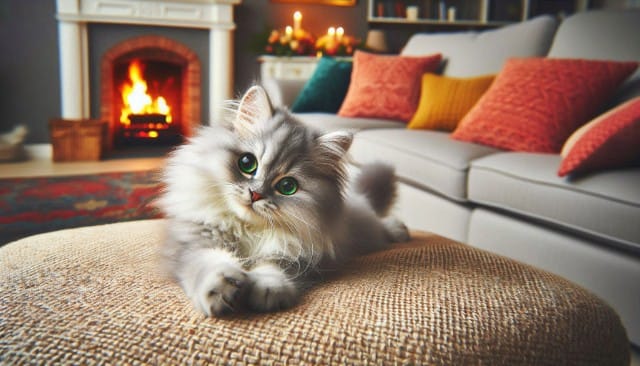
If you’re reading this, chances are your cat won’t stop meowing at night, you’re wondering “Why Does My Cat Meow at Night?” and it’s driving you crazy. You’re not alone—many cat owners struggle with this. Just when you’re about to fall asleep, your furry friend decides it’s the perfect time for a midnight concert.
So, why does this happen? More importantly, how do you stop it without losing your mind? Let’s dive into the reasons behind nighttime meowing and the best ways to fix it.
Why Do Cats Meow at Night?
Before we get into solutions, it’s important to understand why your cat is meowing at night in the first place. Here are the most common reasons:
1. Cats Are Naturally Nocturnal
Cats are hardwired to be most active at dawn and dusk. In the wild, this is when they’d be hunting. Even though your indoor cat isn’t chasing mice for survival, their internal clock still tells them to be awake at night.
2. They Want Attention
Let’s be honest—cats love attention, especially when they feel ignored. If you’ve been busy all day and haven’t played with them much, they might try to get your attention at night when everything is quiet.
3. They’re Hungry
Hunger is one of the main reasons cats meow at night. If your cat eats dinner too early, they might wake you up demanding food.
4. They’re Bored
Cats are smart and need mental stimulation. If they don’t get enough activity during the day, they might get restless and vocalize at night.
5. They Have a Medical Issue
If your cat suddenly starts meowing excessively at night, it could be due to pain, discomfort, or an underlying health issue. Older cats, in particular, may develop cognitive dysfunction (similar to dementia in humans), which can cause confusion and excessive meowing.
👉 When to see a vet: If your cat’s meowing is unusual, excessive, or accompanied by other symptoms (e.g., weight loss, aggression, changes in appetite), it’s best to get them checked by a vet.
How to Stop Your Cat from Meowing at Night
Now that we know why cats meow at night, let’s talk about how to fix it.
1. Adjust Their Feeding Schedule
If your cat wakes you up for food, try feeding them later in the evening or giving them a small snack before bedtime.
✅ Use an automatic feeder – This way, your cat learns that food comes from the feeder, not from waking you up.
✅ Choose a protein-rich dinner – Foods with high protein content keep your cat fuller for longer.
2. Increase Daytime Activity & Playtime
A tired cat is a quiet cat. If your cat has too much energy at night, it means they aren’t getting enough stimulation during the day.
✔️ Interactive toys – Wand toys, laser pointers, and puzzle feeders keep cats engaged.
✔️ Regular play sessions – Aim for two 10–15 minute sessions during the day, ideally before their evening meal.
✔️ Cat trees & climbing shelves – These give your cat a space to explore and burn off energy.
3. Create a Comfortable Sleeping Environment
If your cat doesn’t have a cozy place to sleep, they might roam around the house meowing.
🛏️ Provide a warm, soft cat bed – Cats love small, enclosed spaces where they feel safe.
🚪 Decide if your cat sleeps in your room or not – If you don’t want your cat in your bedroom, set up a cozy space for them in another room with all their essentials.
💡 Use a nightlight for senior cats – Older cats with vision issues may feel disoriented in the dark.
4. Ignore Attention-Seeking Behavior (But Not Medical Issues!)
If your cat meows just to get attention, responding to them will reinforce the behavior.
🚫 What NOT to do:
❌ Don’t yell at them—it won’t help.
❌ Don’t use a squirt bottle—it damages your bond.
❌ Don’t get up to feed them unless it’s their scheduled mealtime.
✅ What to do instead:
✔️ Stay consistent—ignore the meowing and only give attention when they’re quiet.
✔️ Make sure they have everything they need before bed (food, water, litter box access).
✔️ If the meowing continues for weeks, check with a vet to rule out medical issues.
Common Mistakes to Avoid
Even with the best intentions, cat owners sometimes make mistakes that accidentally encourage nighttime meowing.
🚫 Mistake #1: Giving In to the Meowing – If you get up and feed them or play with them, they’ll learn that meowing = getting what they want.
🚫 Mistake #2: Not Providing Enough Stimulation – If your cat spends all day sleeping, they’ll be wide awake at night.
🚫 Mistake #3: Locking Them in a Room Without Prep – Suddenly shutting them in a room without toys, food, or a cozy spot can make them even more anxious and vocal.
FAQs
Q: Is nighttime meowing normal for all cats?
Yes, it’s common, but if it’s excessive or sudden, there could be an underlying issue.
Q: Do certain cat breeds meow more at night?
Yes! Breeds like Siamese, Bengal, and Oriental cats are naturally more vocal than others.
Q: Can neutering/spaying reduce excessive meowing?
Yes, especially in unspayed female cats in heat and unneutered males looking for a mate.
Also read - Why Do Cats Sleep So Much?
Final Thoughts
If your cat won’t stop meowing at night, don’t worry—there are solutions! Make sure they’re well-fed, entertained, and comfortable before bedtime. If the behavior continues, consider a vet checkup to rule out medical issues.
Have you dealt with a noisy nighttime cat? Share your experience in the comments! 🐱👇




